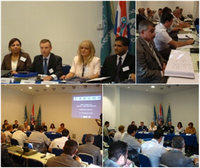The development of a Mediterranean strategy on ships’ ballast water management on the right track – Sep 11, 2008
The development in the Mediterranean region of a Strategy addressing the transfer of harmful aquatic organisms and pathogens via ships’ ballast water and sediments is on the right track as eighteen Mediterranean coastal States and the European Commission, during a meeting held last week in Dubrovnik, Croatia, decided to form a regional Task Force to develop such a Strategy and promote bringing into effect the 2004 International Convention for the Control and Management of Ships’ Ballast Water and Sediments (BWM Convention) adopted under the aegis of the International Maritime organisation (IMO). Four Mediterranean coastal States (Egypt, France, Spain and Syria) have ratified or accessed to the BWM Convention which shall enter into force 12 months after the date on which not less than 30 States, the combined merchant fleet of which constitute not less than 35 % of the gross tonnage of the world’s merchant shipping, have ratified it. The Meeting unanimously agreed that Croatia should chair the Task Force during its first term, i.e. until the second Meeting of the Task Force, to take place in 2010.
The Task Force members further agreed upon principles, main key elements and appropriate format such a Strategy should adopt. It was also decided that an Action Plan, containing operational arrangements, should be developed as part of the Strategy.
In order to fasten the process, four Focus Groups, each led by a Mediterranean coastal State, were established on specific subjects’ matters, namely risk assessment (Turkey), legal aspects (Croatia), capacity building (Cyprus) and policies monitoring (Italy).
The Task Force and its Focus Groups will work by correspondence and the initiative will be presented for endorsement to the Meeting of Focal Points of the Regional Marine Pollution Emergency Response Centre for the Mediterranean Sea (REMPEC), to take place in Malta, in April 2009, and consequently submitted to the 16th Meeting of the Contracting Parties to the Barcelona Convention, to take place in Marrakech, Morocco, in November 2009.
The Dubrovnik Meeting was organised on the 11 and 12 September 2008 by REMPEC within the framework of the GEF / UNDP / IMO Project “Building partnerships to assist developing countries to reduce the transfer of harmful aquatic organisms in ship's ballast water (Globallast Partnerships)”, in cooperation with the UNEP/MAP’s Regional Activity Centre for Specially Protected Areas (RAC / SPA) and the Ministry of Sea, Transport and Infrastructure of Croatia.
A special message was addressed to the Meeting by Dr. Ahmed Djoghlaf, Executive Secretary of the United Nations Convention on Biological Diversity (UNCBD), which highlighted that invasive alien species is one of the major threats for biodiversity and that out of 121 species listed as Europe’s 'worst invasives' since the year 2000, 105 were reported in the Mediterranean Sea. The Executive Secretary stated “It is our hope that this meeting will help to further improve the capacity of the guardians of the Mediterranean Sea to minimize and control the spread of alien and potentially harmful organisms” and welcomed the initiative of the Mediterranean region and of the IMO’s GloBallast Partnerships towards effective control of marine invasive alien species.
The IMO’s Marine Environment Protection Committee (MEPC) Chairman, Mr. Andreas Chrysostomou, addressed the Meeting on the importance of ratifying the BWM Convention, the GloBallast Programme providing an excellent way to help countries in the region to understand the problem, monitor the situation and prepare for the implementation of the Convention.


